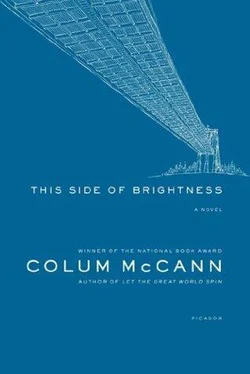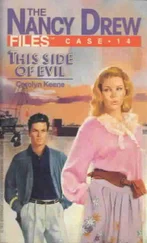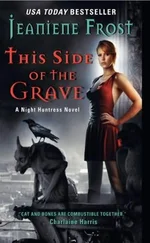“That’s what happens to a cop killer,” they say.
Walker stares at his son’s accusers.
“You know,” says one of the cops, “I got myself one of your kind in my family tree.” He gouges at his teeth with a toothpick. “Just a swinging away from the highest branch.”
Walker’s eyes are misty with tears. He fights them back, bites his lip.
When he returns to his hotel room he falls on the dirty sheets, lets the evening’s mosquitoes rave around him. He doesn’t even flinch as they bite. He thinks for a moment about revisiting the Okefenokee of his boyhood but decides against it. When he boards the train to New York his face is puffy with red welts. A conductor shoves him toward the rear carriage. From the train window he watches the landscape of America flow by.
* * *
Back home, he sleeps in Clarence’s bed. Then he moves across and arranges the pillows beside the ghost of his wife. All three of them lie down together. The pulse of Louis Armstrong sounds out from the record player, the notes moving tenderly through his torment.
* * *
On a pale weekday he buries Clarence, laying him beside Eleanor in a Bronx graveyard. His daughters and Louisa stand behind him.
Walker kneels at the stone but doesn’t say any prayers. Prayers strike him as flaccid things now — useless supplications curling out only as far as the throats of men before falling back down into their stomachs. Spiritual regurgitation. He ignores the nearby gravediggers, who stand fat and complacent over the freshly dug hole. Walker takes a shovel, throws the first clodful over his son’s coffin. He steps back and gathers his daughters in his arms, and they walk together to a waiting car.
He has hired the car to drive his family home. The girls clamber in, but Walker decides to go alone. Dull gray birds escort him as he walks through the Bronx all the way across the bridge to his street in Harlem — a five-hour walk — where he tells himself that he will strap his body to the sofa, elbow on the armrest, for the rest of his years. Even the idea of revenge strikes him as hollow.
Walker stares at the ceiling, his body a dark room of nothingness, empty, vacant. He recognizes the necessity of sorrow — if sorrow fades, so too does memory. He keeps the sorrow alive for the sake of memory, evoking Eleanor’s movements, rehearsing them in his brain. His head spins through their gymnastics of love. Small shocks of remembered bliss. He aggregates the beauty of their lives together, weighs it in his fingers. Even the dullest moments over teacups are replayed in his mind. He does the same with the memory of Clarence, then combines them, wife and son standing together at the piano, where he talks to them.
“Eleanor,” he whispers, “you’re looking good.”
“Hey, Clar, go get your momma her hairbrush.”
“I’ve never seen you look so fine, honey.”
“Thank you, son,” he says, reaching for a hairbrush that isn’t there. “Give us a moment together, your momma and me.”
And, after a silence, “He’s growing up like a flower, ain’t he, El?”
The days go by with a vicious lethargy. Even light is slow to fade. The future feels postponed by an eternal present. Walker develops a horror of time. He turns the clock face against the wall. The only day he recognizes is Sunday, because of the sight of churchgoers out the window. He resents their white teeth, their joy, the comfortable tuck of Bibles under their arms. As they walk, the gospel music seems already to be rising in them, the way they move on the tips of their toes. They will go to church and lift their voices to some useless heaven. A unified song of self-deception. God only exists in happiness, he thinks, or at least in the promise of happiness.
Walker turns his Bible spine in against the wall, bricks it in with other books, unread. Let them go on down to their ridiculous churches. Let them sing to their ceilings. You won’t find me beseeching no Jesus. I’m finished with all that.
He doesn’t move to the record player, just lets himself sink down into the folds of the couch. Beside him, a spittoon grows full and brown with chewing tobacco. He spits out a decayed tooth one morning, thinks nothing of it. He shoves aside plates of food. His daughters and Louisa bring him cups of tea that grow cold at his elbow. The window is shut to the sounds of the street. Walker mutters invectively to himself. Over the weeks, he grows wasted and haggard, and huge bags develop under his eyes. The spittoon overflows and stains the armrest. He shoos the preacher away from the door and asks his daughters to tell Rhubarb Vannucci that he isn’t home in case the Italian comes calling.
He hardly even looks at his grandson in the crib; the boy is just a meaningless blur of flesh.
At night, Louisa tries to get him to go down the hallway to the bath, to wash, but he becomes a brick in her hands and she gives up. He welcomes himself back to the sofa. “This is where I’ll lie,” he says. He might let his body melt into the cushions and stay there forgotten, like one of his dropped coins. He might reach down for the decayed parts of himself and throw them out the window to the ghost of Clarence below on the stoop: bits of arms, legs, fingers, and an eyeball as a currency for the gone.
He notices that his daughters have begun to stay out late at night, but he says nothing. Louisa remains in the apartment with him, bottles of tequila in a ring around her. The alcohol lies heavy on her breath. She spends her time fashioning ancestral beads to sell at a market. Between them there is a contagion of hush.
She has decided to call the baby Clarence Nathan, after his father and grandfather. But Walker dismissed the name with a wave of his arm, glad of the pain it brings him. “Call him whatever the hell y’all want.”
Louisa works on a dream catcher, which she suspends above the boy’s head. The dream catcher is made with twigs in the shape of a triangle, crisscrossed with yarn; a dogtooth and beads and a feather tied onto the threads.
“It’ll catch his dreams,” she says.
“They’ll go nowhere else,” says Walker.
“Don’t be so bitter. I can’t stand it.”
“I’ll be bitter if I goddamn want to.”
“I’m leaving,” she says.
“Leave. Take your bottles. Grab y’alls beads and strings and thread and wrap ’em around your bottles and make a goddamn raft for yourself.”
She doesn’t leave, and she watches him fade further into the couch. At times she cooks for him and works with great tenderness, even when she’s drunk — baked chicken, rice and beans, cucumber sandwiches — yet she finds herself drinking more and more. She changes the size of the bottles she buys. They make a great bulge in the grocery bags where she tries to hide them. Sometimes she drops tequila in the food just so she can smell it as she leans over the stove.
And then one morning she emerges from the bathroom to hear Walker muttering to himself. She is surprised at the sound of his voice, clear and deep and lunatic.
“I bet he didn’t even see them,” he says. “I bet he didn’t even see them.”
“What’s that?” she asks.
“Nothing.”
“What did you say?”
“Nothing.”
“See what?”
“See goddamn anything!” he shouts. “They shot him in a junkyard! He didn’t get to see all the things I told him about! A goddamn crane! He didn’t even get a chance to see a crane! That’s what I wanted for him! Ever since he was born! I wanted him to see a crane dance! Don’t look at me that way! Fuck you if you think that’s stupid! Fuck you! I wanted him to see a crane! That’s what I wanted! I never got the chance to show him even that!”
There is a querulous rising and falling in his chest as he gasps for air. Louisa puts a hand on his shoulder and he slaps it away, letting a dribble of tobacco run down his chin.
Читать дальше












